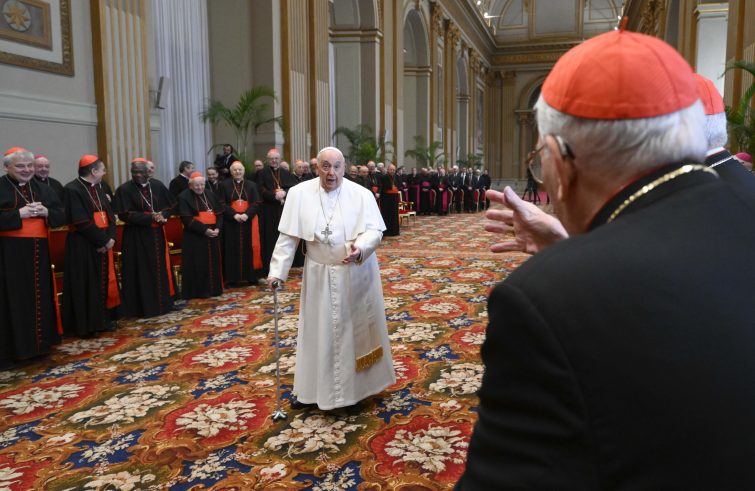
“In the Curia too, we need to learn the art of listening”, Pope Francis highlighted this point in his traditional address to the Roman curia for the exchange of Christmas greetings in the Benediction Hall. Francis walked to his seat with the support his cane, accompanied by the applause of those present, to whom he addressed a clear reminder: “Even more important than our daily tasks and responsibilities, or even the positions we hold, is our need to appreciate the value of relationships, to keep them simple and straightforward, marked by an evangelical spirit, above all by our ability to listen to one another. With the heart and on our knees.”
“Let us increasingly listen to each other, free of prejudices, with openness and sincerity”, Francis said: “Let us listen to one another, trying hard to understand what our brother or sister is saying, to grasp his or her needs and in some way his or her own life, which lies hidden behind those words, and without judging.”
Francis thus went on to cite Saint Ignatius: “Let it be presupposed that every good Christian is to be more ready to save his neighbour’s proposition than to condemn it. If he cannot save it, let him inquire how he means it; and if he means it badly, let him correct him with charity. If that is not enough, let him seek all the suitable means to bring him to mean it well, and save himself. It takes effort to really understand another person.”
“We need to hear and accept this message anew, especially in these days tragically marked by the violence of war, by the momentous risks posed by climate change, and by poverty, suffering, hunger – there is hunger in the world! – and all the grave problems of the present time”,
Pope Francis said referring to the upcoming Christmas in the opening lines of his address that revolves around three verbs: to listen, to discern, to fare forward, and to three figures on three corresponding guiding figures: Mary, John the Baptist, the Magi. “Discernment ought to help us, even in the work of the Curia, to be docile to the Holy Spirit, to choose procedures and
make decisions based not on worldly criteria, or simply by applying rules, but in accordance with the Gospel”,
the imperative for the second verb: “Discernment, then, is important for us all. As an art of the spiritual life, it can strip us of the illusion of omniscience, from the danger of thinking that it is enough simply to apply rules, from the temptation to carry on, even in the life of the Curia, by simply repeating what we have always done. And in this way failing to realize that the Mystery of God is always beyond us and that the lives of people and the world around us are, and will always remain, superior to ideas and theories”, Francis remarked.
“Life is always superior to ideas”,
he added off text. The Pope then quoted from a text by Cardinal Martini: “Discernment is quite different from the meticulous exactitude of those who live in legalistic conformity or with pretensions to perfectionism. It is a burst of love that distinguishes between good and better, between what is helpful in itself and what is helpful here and now, between what may be good in general and what needs to be done now”, continuing the quotation, Francis said: “Failure to strive to discern what is best often makes pastoral life monotonous and repetitive: religious acts are multiplied, traditional gestures are repeated, without clearly seeing their meaning.”
“So whenever the service we offer risks becoming dull, enclosed in the ‘labyrinth’ of rigidity or mediocrity, whenever we find ourselves entangled in the web of bureaucracy and content ‘just to get by,’ let us always remember to look up, to start afresh from God, to be enlightened by his word and to find the courage needed to start anew.”
Thus the Pope explained the third verb chosen to guide his speech to the Curia: to fare forward. “The only way to escape from a labyrinth is to see things ‘from above’, he suggested: “It takes courage to journey, to fare forward. It is a matter of love.” “In our service here in the Curia too, it is important to keep faring forward, to keep searching and growing in our understanding of the truth, overcoming the temptation to stand still and never leave the ‘labyrinth’ of our fears”, is Francis’ exhortation, for whom “fear, rigidity and monotony make for an immobility that has the apparent advantage of not creating problems – ‘stay put, don’t move’ – but lead us to wander aimlessly within our labyrinths, to the detriment of the service we are called to offer the Church and the whole world.” In this respect, the Pope cited “something I once heard from a zealous priest, which can also help us in our work in the Curia”: “He said that it is not easy to rekindle the embers under the ashes of the Church. Today we strive to kindle passion in those who have long since lost it.
Sixty years after the Council, we are still debating the division between “progressives” and “conservatives,” but that is not the difference: the real, central difference is between lovers and those who have lost that initial passion. That is the difference. Only those who love can fare forward.”
“The Christian faith – let us remember – is not meant to confirm our sense of security, to let us settle into comfortable religious certitudes, and to offer us quick answers to life’s complex problems”, Francis remarked, exhorting to remain
“vigilant against rigid ideological positions,
that often, under the guise of good intentions, separate us from reality and prevent us from moving forward.” “Please, I encourage you, let us never lose our sense of humour, which is healthy!” is the Pope’s final recommendation before the good wishes for a blessed Christmas.











